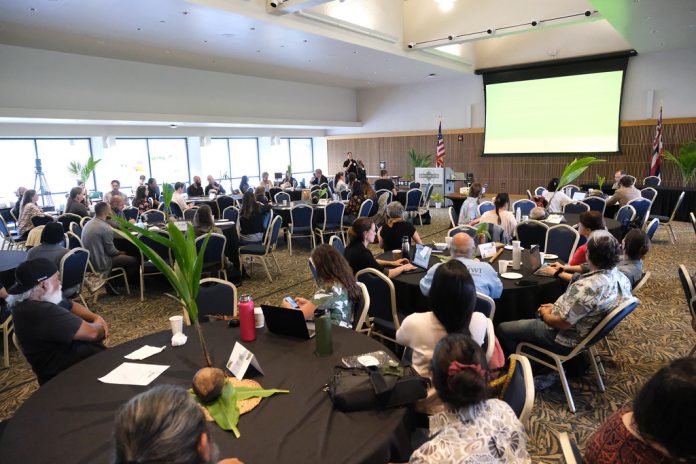The Transforming Hawai‘i’s Food Systems Together (THFST) initiative presented its 2nd Annual Hawai‘i Food System Summit on Dec. 14 and 15 at the University of Hawai‘i–West O‘ahu, where food system change advocates met with state representatives and determined top priority food and agriculture policy issues to pursue in the upcoming 2024 legislative session.
THFST is an initiative that seeks to build statewide capacity and pave the way for a more robust, sustainable, and resilient food system, especially in times of crisis.
“The annual Hawai‘i Food System Summit brings together stakeholders from across the islands to collaboratively discuss and evaluate food and agriculture public policy,” said Dr. Albie Miles, THFST member, summit co-organizer, and associate professor of Sustainable Community Food Systems at UH West O‘ahu.
Miles continued, “Our goals are to raise awareness of pressing agri-food issues, understand policy ideas being presented in the upcoming legislative session, develop collaborative working relationships with lawmakers, and ultimately, craft a common vision and strategy for promoting a healthy, equitable, culturally-appropriate, resilient, and sustainable food system for Hawai‘i.”
More than 150 participants convened on campus at the two-day event, which featured a program including a “Reflections and Strategies for Progress” Legislators Forum with state Sen. Donovan Dela Cruz, state Sen. Mike Gabbard, and state Rep. Kirstin Kahaloa; a “Pathways Forward” presentation by Dexter Kishida, deputy to the chairperson of the Hawai‘i Department of Agriculture (HDOA); and virtual remarks by U.S. Rep. Jill Tokuda. The summit opened with a welcome from UH West O‘ahu Chancellor Maenette Benham.
“Over the next couple of days, I hope that you each open up your hearts and your minds, dream, wonder, push each other, challenge, be uncomfortable, ask the questions, and leave here knowing what you need to do next,” Benham said.
According to a press release from THFST, through open space conversations and collective work, summit participants ranked 30 policy interest areas using nine criteria to determine their top four policy issues to unite behind and pursue during this upcoming legislative session. These policy issues were:
- Expanding Hawai‘i’s Farm to School Programs: Work with the Department of Education to increase use of locally sourced foods in school meals.
- Supporting Indigenous, Traditional Ecological Knowledge (ITEK): Pursue subsidization for the production and purchasing of culturally significant crops such as kalo and ‘ulu.
- Increasing Food System Resilience and Disaster Preparedness: Better equip Hawai‘i’s food system for the climate crisis and increase disaster preparedness capabilities across our islands.
- Securing Permanent Funding for DA BUX: Strengthen the Double Up Food Bucks (DA BUX) program by securing permanent funding for this vital SNAP supplement benefit in the upcoming legislative session.
Organizers also unveiled at the summit the first draft of an Integrated State Food Policy Framework for Hawai‘i — a comprehensive approach to addressing the complex and interrelated issues of food and nutrition security, sustainable agriculture, rural development, and environmental sustainability and resilience. It aims to provide a framework for coordinated and inclusive action across different agri-food sectors to promote a healthy, equitable, resilient, and sustainable food system.
In addition, Kishida announced the intention of HDOA along with the Office of Planning and Sustainable Development to reintroduce and co-chair a revised state-level food system planning bill based on HB308 (2023). The intention of such a bill is to form a multi-agency and multi-sector working group responsible for outlining a plan and strategy to direct development of the food system and enable Hawai‘i to reach a range of social, cultural, economic, and ecological sustainability objectives aligned with state goals.
Organizers also worked to articulate a new Hawai‘i Food Policy Network that would serve to unite and organize advocates and organizations working on food system transformation in Hawai‘i, ensuring their efforts for change are coordinated, comprehensive, and efficient in their use of resources, according to the release.
“Those of us here at the Hawai‘i Food System Summit are increasingly a social movement to be reckoned with,” Mahina Paishon-Duarte, summit organizer and THFST core team member, said in the release. “There is a large constituency showing up on these issues, and we are a movement with political power.”
Summit recap information will all be made available at www.transforminghawaiifoodsystem.org.
To see photos from the event, visit the UH West O‘ahu hosts 2nd Annual Hawai‘i Food System Summit album on Flickr.
